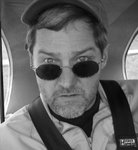“Launch the Revolution”
© 2006, Paul Berge
© 2006, Paul Berge
By afternoon the crowd had grown to several thousand around the airport’s perimeter. Faces turned skyward with eyes shaded against the sun when an official worried, “He refuses to come down.”
Even the guards in the tower protected by concertina wire gazed at the small airplane overhead, unsure what to do. The tower chief ran up the stairs, her footsteps clanging against steel. Breathless, she demanded binoculars although it was clear she’d never see the truth. “How long has that been up there?”
“Ten hours,” a tower guard answered through a smile. “Maybe twelve.”
“That’s impossible.”
“So we thought,” he replied and then indicated the crowd below. “But word spread. This morning it was just a few. Now look at the cars coming from all directions.” Indeed, the roads were packed. More people arrived on bicycles and some on foot to see the man who flew without permission, refusing to come down.
Disgusted, the tower chief pressed the binoculars at the guard and demanded, “Have you ordered him down?” And before he could reply the crowd murmured as the tiny airplane, little more than a butterfly with yellow wings and a green tail, lowered its nose. “What’s he doing?”
“A loop, I think…Yup, it’s a loop.”
“Well, stop him, make him stop that illicit looping!”
The crowd applauded as the little airplane traced a perfect O. And in one voice they gasped when the airplane pulled into what appeared to be another loop but at the top did not dive. Instead, it hung in the air, its silver propeller slicing the blue. Its wings slowly rotated from the torque until they realized they could no longer lift and dropped into a spin. In turn after turn the airplane spun toward the earth. And then as crash trucks lurched and eyes peered between fingers, it climbed again bringing a shout from the crowd.
“I’ll take his license!” the tower chief spat.
“You’ve already taken all the licenses,” the guard noted. “Nothing left to take.” And he, too, silently cheered the pilot.
“That’s...that’s nonsense!”
“Isn’t it, though,” the guard laughed and then pointed toward the hangars where more pilots—without authorization—smashed locks and pushed little airplanes into the sunlight. The tower chief grabbed a microphone and tried to restore order, but her mouth only flapped like a bass sucking air in a fisherman’s net. Powerless, she watched engines start, and without any regard for her authority dozens of little airplanes taxied to the runway. She managed a gagging plea to “Stop…” but stared in disbelief at those who escaped her grasp and lifted into what she’d presumed was her sky, a sky to be jealously controlled.
Slumping into administrative oblivion she vanished amid the sound of airplanes twirling about her head. Soon the guards abandoned the tower to join the mob as it swarmed over the fence and spread blankets on the grass. And long past sunset they watched the power of lift wielded by revolutionaries who refused to come down.
Even the guards in the tower protected by concertina wire gazed at the small airplane overhead, unsure what to do. The tower chief ran up the stairs, her footsteps clanging against steel. Breathless, she demanded binoculars although it was clear she’d never see the truth. “How long has that been up there?”
“Ten hours,” a tower guard answered through a smile. “Maybe twelve.”
“That’s impossible.”
“So we thought,” he replied and then indicated the crowd below. “But word spread. This morning it was just a few. Now look at the cars coming from all directions.” Indeed, the roads were packed. More people arrived on bicycles and some on foot to see the man who flew without permission, refusing to come down.
Disgusted, the tower chief pressed the binoculars at the guard and demanded, “Have you ordered him down?” And before he could reply the crowd murmured as the tiny airplane, little more than a butterfly with yellow wings and a green tail, lowered its nose. “What’s he doing?”
“A loop, I think…Yup, it’s a loop.”
“Well, stop him, make him stop that illicit looping!”
The crowd applauded as the little airplane traced a perfect O. And in one voice they gasped when the airplane pulled into what appeared to be another loop but at the top did not dive. Instead, it hung in the air, its silver propeller slicing the blue. Its wings slowly rotated from the torque until they realized they could no longer lift and dropped into a spin. In turn after turn the airplane spun toward the earth. And then as crash trucks lurched and eyes peered between fingers, it climbed again bringing a shout from the crowd.
“I’ll take his license!” the tower chief spat.
“You’ve already taken all the licenses,” the guard noted. “Nothing left to take.” And he, too, silently cheered the pilot.
“That’s...that’s nonsense!”
“Isn’t it, though,” the guard laughed and then pointed toward the hangars where more pilots—without authorization—smashed locks and pushed little airplanes into the sunlight. The tower chief grabbed a microphone and tried to restore order, but her mouth only flapped like a bass sucking air in a fisherman’s net. Powerless, she watched engines start, and without any regard for her authority dozens of little airplanes taxied to the runway. She managed a gagging plea to “Stop…” but stared in disbelief at those who escaped her grasp and lifted into what she’d presumed was her sky, a sky to be jealously controlled.
Slumping into administrative oblivion she vanished amid the sound of airplanes twirling about her head. Soon the guards abandoned the tower to join the mob as it swarmed over the fence and spread blankets on the grass. And long past sunset they watched the power of lift wielded by revolutionaries who refused to come down.
©2006, Paul Berge
(First appeared in Pacific Flyer magazine, March 2007)
